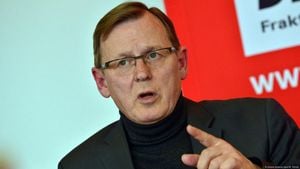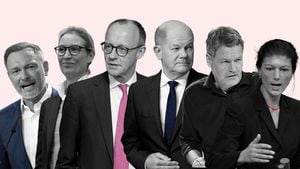On February 23, 2025, Germans went to the polls for the 21st Bundestag election, and preliminary results indicate significant shifts within the political spectrum. According to forecasts from the ARD, the conservative bloc of CDU and CSU leads the national vote, closely followed by the far-right Alternative for Germany (AfD), which recorded 19.5% of the votes. The formation of the next government will depend heavily on coalition negotiations, with the CDU already hinting at potential partnerships.
The election saw approximately 237,000 residents of Münster casting their ballots across 189 polling districts and 98 mail-in districts. Syliva Rietenberg of the Greens and Stefan Nacke from the CDU were locked in what appeared to be a neck-and-neck race for the first votes, both nearing 30%. Rietenberg edged slightly higher, with the SPD's Svenja Schulze tallying about 20% and the Left capturing 13%. The FDP barely scraped below the threshold with just under 5%. Following the elections, Schulze, who also serves as the Federal Minister of Development, acknowledged her party's struggles, particularly emphasizing the impact of the AfD's surprising support.
Markus Lewe, the mayor of Münster and member of the CDU, expressed disappointment about the low turnout, which saw only a few dozen politically engaged citizens attending vote counting at city hall. Nonetheless, the excitement surrounding the election was palpable, with many speculating about coalition possibilities as early results flowed throughout the night.
Down south, the election results were tracking similarly. Reports from Saxony-Anhalt indicated CDU and AfD expected to be the strongest parties, each buoyed by early projections showing CDU capturing 28.9% and the AfD with 19.7%. CDU's state leader Sven Schulze heralded the anticipated results as “a clear victory,” predicting Friedrich Merz would likely head the next federal government.
On the other hand, the SPD faced significant backlash over their performance. Party leader Juliane Kleemann candidly remarked, “We were prepared for this not to be our night,” though the party had anticipated doing slightlybetter. She cited the overwhelming public discussions around security and migration as major factors pulling votes away from progressive platforms. Conversely, Dennis Helmich, co-leader of the Greens, described his party’s results as “solid” but acknowledged the tense campaign climate affected their messaging.
Election day also saw unexpected challenges for smaller parties. The FDP, which has traditionally aimed for pivotal roles, was reported to have fallen short of the 5% requirement to enter parliament, garnering Only 4.9%. Lydia Hüskens, the leader of the party at the state level, called it “disheartening” but emphasized the need for reflection on their economic messaging, which failed to resonate with voters. Meanwhile, the Left party celebrated surpassing the 5% threshold with projected results of around 8.6%, showing hope for their future legislative influence.
Brandenburg also turned out to be significant battleground territory for the AfD. By the time the votes were largely counted, the AfD was on track to almost double its 2021 performance, approaching 33%. Observers noted they were likely positioned to win nine out of ten electoral districts, marking what many were calling a historic moment for the party. Their triumph will be especially pronounced if they manage to replace the previously dominant SPD, which had swept all districts last election.
The situation reflected the changing dynamics across Germany's political fabric, with parties like the AfD capitalizing on growing discontent among voters. Alice Weidel, the AfD's chancellor candidate, termed her party's performance “historic” and welcomed potential coalition discussions with the CDU, highlighting readiness to shape the future government.
With results still pending from some areas, experts predict intense negotiations to follow. The expectation is set for official results to emerge as districts finish their tallies. Presumably, the newly formed coalition will stimulate or stifle the policies depending on which parties are able to successfully align their agendas with enough common ground.
The electorate's shifting sentiments are indicative of broader trends within Europe; as challenges mount across various dimensions—be it economic, social, or environmental—the appetite for decisive political action appears ever more pressing. Both political analysts and citizens are left to ponder the consequences of these outcomes and what they portend for Germany's socio-political future.



